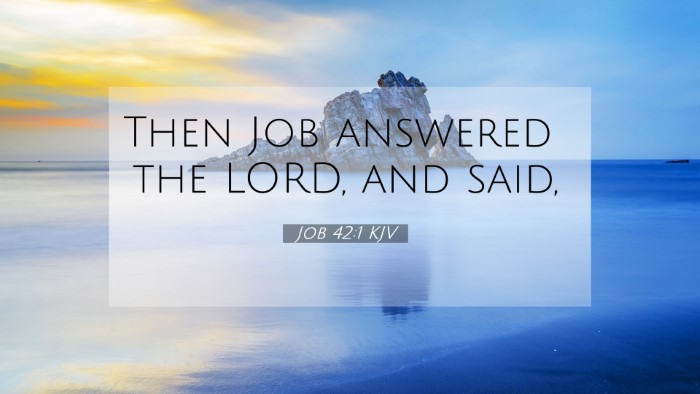Old Testament
Genesis Exodus Leviticus Numbers Deuteronomy Joshua Judges Ruth 1 Samuel 2 Samuel 1 Kings 2 Kings 1 Chronicles 2 Chronicles Ezra Nehemiah Esther Job Psalms Proverbs Ecclesiastes Song of Solomon Isaiah Jeremiah Lamentations Ezekiel Daniel Hosea Joel Amos Obadiah Jonah Micah Nahum Habakkuk Zephaniah Haggai Zechariah MalachiJob 42:1 Similar Verses
Job 42:1 Cross References
Then Job answered the LORD, and said,
Uncover the Rich Themes and Topics of This Bible Verse
Listed below are the Bible themes associated with Job 42:1. We invite you to explore each theme to gain deeper insights into the Scriptures.
Job 42:1 Cross Reference Verses
No cross reference images were found in our system for this Bible passage.
Job 42:1 Verse Analysis and Similar Verses
Understanding Job 42:1
The book of Job concludes with a profound statement from Job himself, illustrating his recognition of God's sovereignty and his own limitations. Job 42:1 states:
"Then Job answered the LORD, and said."
Summary of Insights
The following analysis combines interpretations from notable public domain commentaries, providing a comprehensive understanding of Job 42:1.
Contextual Background
Job's response in chapter 42 comes after a series of conversations with God, during which he was questioned about the creation and order of the universe. His previous lamentations and arguments illustrate his struggle and yearning for understanding regarding his suffering.
Key Interpretations
- Matthew Henry: In his view, this verse encapsulates Job’s acknowledgment of God’s authority and wisdom. Job's answer signifies his recognition that he cannot challenge God’s plans or understanding. It emphasizes the importance of humility before the divine.
- Albert Barnes: Barnes notes that Job’s reply signifies not just acknowledgment but a profound understanding of his own insignificance compared to God's greatness. This humility leads Job to a place of acceptance and peace regarding his trials.
- Adam Clarke: Clarke elaborates on the significance of Job's words, highlighting that this dialogue with God represents a pivotal moment of truth for Job. He no longer questions God but rather submits to divine wisdom, reflecting a transformation in Job's faith.
Thematic Connections
This verse can be linked to several broader themes within the Bible, such as:
- The Nature of Suffering: Job’s experience is reflective of human suffering and the struggle to maintain faith amidst trials.
- Divine Sovereignty: God's overarching control and wisdom are central to the understanding of our existence and circumstances.
- Humility: The need for humility before God is a recurrent theme in biblical texts, seen in Job’s transformation.
Cross-References
Several Bible verses resonate with the themes presented in Job 42:1. Consider the following:
- Isaiah 55:8-9: "For my thoughts are not your thoughts, neither are your ways my ways, saith the LORD."
- Romans 9:20: "Nay but, O man, who art thou that replyest against God?"
- Psalms 139:14: "I will praise thee; for I am fearfully and wonderfully made."
- Proverbs 3:5-6: "Trust in the LORD with all thine heart; and lean not unto thine own understanding."
- 1 Peter 5:6: "Humble yourselves therefore under the mighty hand of God, that he may exalt you in due time."
- Job 1:21: "The LORD gave, and the LORD hath taken away; blessed be the name of the LORD."
- Jeremiah 29:11: "For I know the thoughts that I think toward you, saith the LORD..."
Conclusion
Job 42:1 encapsulates a critical moment in Job's journey, reflecting themes of divine authority, human humility, and the complexity of suffering. This verse encourages believers to recognize the importance of submitting to God's will and understanding our place in His grand design.


